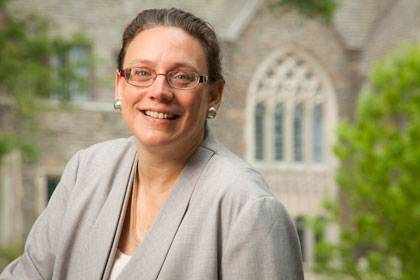
In 2010, the National Institute for Learning Outcomes Assessment talked to dozens of university presidents to learn what was driving their institution's assessment initiatives. All said assessment is important for institutional integrity and works best when faculty are actively involved.
They noted another factor as well, which they said often brings the issue into sharp focus: an upcoming visit from the accreditation agency. (See the institute's report here.)
Those visits lead to evaluations that often find deficiencies in "outcomes assessments" of student learning. That's what happened in the 2009 SACS evaluation of Duke.
For critics such as Thomas Nechyba in Duke's economics department, it's a process that inevitably leads to a growing external bureaucracy "that will never be satisfied with what we do because it does not genuinely understand what we do."
But others say that since Duke has to explain its procedures anyway, it should embrace formal assessment as a way to gain a clearer picture of whether its classes, programs and operations are truly effective. "Assessment is here to stay," said Kristen Neuschel of the Thompson Writing Program. "For one, assessment is embedded in all the grants we're seeing."
Serra, the head of the A&S Office of Assessment, and others working on the issue hope assessment will become an ongoing concern not only of departmental committees but of all faculty members. Teaching and learning will improve if assessment becomes "systematic, systemic and sustainable," with continued support of the administration, Serra said.
And Ruth Day, chair of the A&S Faculty Council, which created the faculty assessment committee, said Duke faculty must and will be creative in setting goals and metrics for assessment.
"We need to go beyond traditional methods of 'assessment,'" Day said. "Many approaches focus on what students know from taking a course, which can be useful. But how do they know it? For example, students might do well on an exam where they have to define key concepts from a course. However they could still vary widely in their knowledge structures -- one might see few or no connections among the concepts, another might see some connections, while others might see connections among all the concepts. Their knowledge structures could consist of a few loose 'clusters' to highly organized patterns. People with more highly organized knowledge structures are better able to apply what they know to new and complex problems. Isn't that a goal of higher education at place such as Duke?"
Top leadership, from Dean Laurie Patton and Lee Baker of A&S to Vice Provost Keith Whitfield, agree. They are pushing for campus assessment systems that will benefit students, faculty and the university rather than merely meeting external demands. "If we can't observe or measure the outcome, we can't be sure our teaching is effective," Patton said.
"I think assessment in general is going to be seen more as a regular practice, rather than as something we have to do for accreditation purposes," said Jessica Thornton, an educational analyst in the provost's office who works with Whitfield to coordinate university-wide assessment efforts. A university committee headed by Robert Byrd of Perkins Library and Bill Marchese of Human Resources assists the office in explaining the process for all of Duke's educational and administrative offices.
"That doesn't mean we won't be required to report to external bodies, because I think the external pressures will increase," Thornton said. "But Duke will find a way to use this process to become better. Once that happens, the value will be apparent."
According to Whitfield, the future of assessment will be determined by faculty members taking ownership and showing initiative. "We've changed the culture about the 'A word,'" Whitfield said. "We need more and more examples of how we can push the envelope."